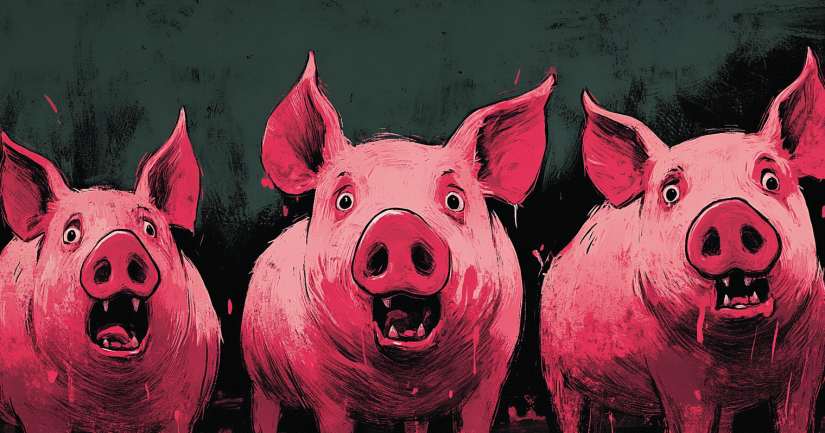
Welcome to the Animal Farm Chapter 9 Quiz! This engaging quiz invites you to dive deeper into the themes and events of this pivotal chapter. As you answer the questions, you’ll uncover important insights about the characters and their struggles. You’ll explore the consequences of power and betrayal, revealing how they shape the fate of the farm.
Each question is designed to prompt reflection. Why do the animals continue to trust their leaders? What do the changes in their living conditions reveal about their hopes and dreams? You’ll gain a clearer understanding of the allegorical elements that George Orwell weaves into his story. Finish the journey in Chapter 10 with our Animal Farm Chapter 10 Quiz
Let’s Begin – Explore the Animal Farm Chapter 09 Quiz Below
By participating, you’ll not only test your knowledge but also enhance your comprehension of the text. This quiz encourages you to think critically about the story’s relevance to our world today.
Enter Orwell’s World of rebellion and power – test yourself with the Animal Farm Book Quiz.
The stakes are higher than ever in Chapter 9! or explore literary techniques in our Animal Farm Literary Devices Quiz.
What Happened – Animal Farm Chapter 9
In Chapter 9 of Animal Farm, the animals face difficult working conditions, food shortages, and the physical toll of rebuilding the windmill. Boxer, despite his age and injuries from the recent battle, remains committed to the farm, working tirelessly with his personal motto, “I will work harder.” Napoleon continues to manipulate the animals, holding celebratory events to distract them from their suffering and enforcing stricter control. He announces that Animal Farm is now a republic, with himself as the only candidate for president.
The pigs continue to alter the commandments and indulge in privileges. For example, they reserve barley exclusively for themselves, using it to brew beer. Despite the hardships, Napoleon and Squealer convince the animals that conditions are better than they were under Mr. Jones.
Boxer’s health deteriorates due to his strenuous labor. One day, he collapses, unable to work. Napoleon tells the animals that Boxer will be sent to a veterinary hospital, but instead, he sells Boxer to a glue factory for money. When the animals see the truck labeled “Horse Slaughterer,” Squealer lies, saying the lettering is from the truck’s previous owner. The animals reluctantly believe him, though they are saddened by Boxer’s death. The chapter ends with a lavish memorial in Boxer’s honor, while the pigs use the money from his sale to buy whiskey.
Animal Farm Chapter 9 – Quotes
- “I will work harder!” – Boxer, continuing his motto even as his health declines, symbolizing the exploitation of the working class.
- “Napoleon is always right.” – Boxer, showing his unwavering loyalty despite his suffering, reflecting his blind faith in leadership.
- “Boxer’s face, with the white stripe down his nose, appeared at the small window at the back of the van.” – Narrator, describing Boxer’s final moments as he realizes he is being sent to the slaughterhouse, illustrating the betrayal of his loyalty.
- “The van had previously been the property of the knacker, and had been bought by the veterinary surgeon, who had not yet painted the old name out.” – Squealer, lying to the animals about Boxer’s fate, revealing the manipulation used to control and pacify them.
- “It was the most affecting sight I have ever seen!” – Squealer, describing Boxer’s supposed peaceful death, manipulating the animals’ emotions to maintain their trust in Napoleon.
- “A few days later it was announced that the pigs had bought themselves another case of whiskey.” – Narrator, highlighting the pigs’ betrayal and self-indulgence, underscoring their complete abandonment of Animalism’s ideals.
Animal Farm Chapter 9 – FAQ
Propaganda plays a crucial role in Chapter 9, illustrating how the pigs control information to maintain their authority. Squealer, the chief propagandist, spins tales of abundance and success, despite the animals’ suffering. The manipulation of language and revision of history serve to pacify the populace and suppress dissent, demonstrating how those in power can distort reality to serve their interests.
Boxer embodies the spirit of hard work and loyalty, but his tragic fate symbolizes the exploitation of the proletariat. His unwavering dedication to the farm ultimately leads to his downfall, as he is betrayed by those he trusted. This serves as a stark reminder of the vulnerability of the working class in the face of deceit and tyranny.
The other animals exhibit a range of reactions, from resignation to confusion. Many struggle to reconcile their harsh reality with the ideals of Animalism, while others cling to hope, despite the overwhelming evidence of betrayal. Their collective response reflects the complexities of oppression and the challenges of uprising against an established regime.
Chapter 9 imparts several lessons about power dynamics and the importance of vigilance in governance. It highlights the dangers of blind loyalty and the ease with which a ruling class can manipulate truth. Readers are reminded of the necessity for critical thinking and the importance of standing up against injustice to prevent the erosion of rights and freedoms
